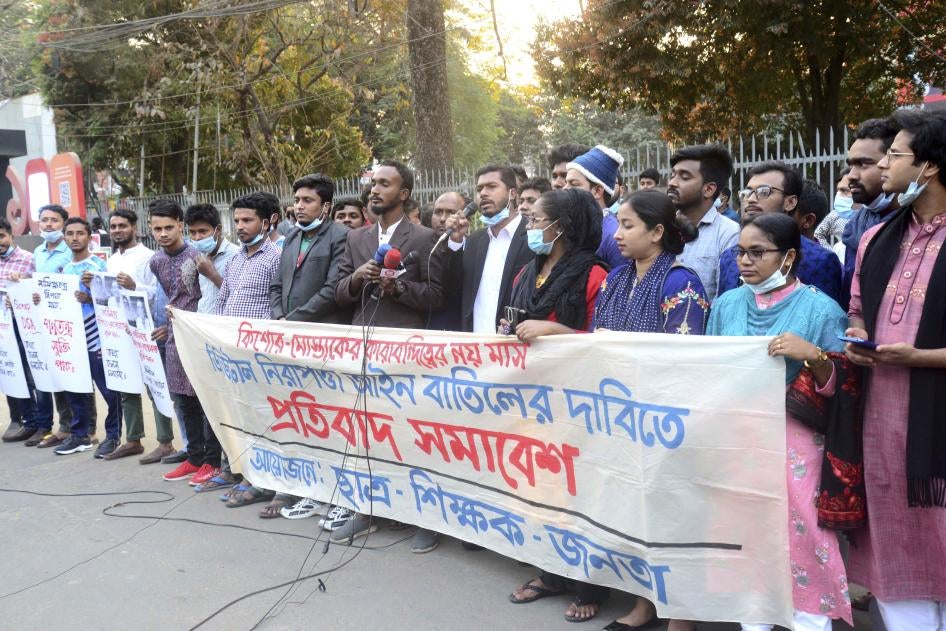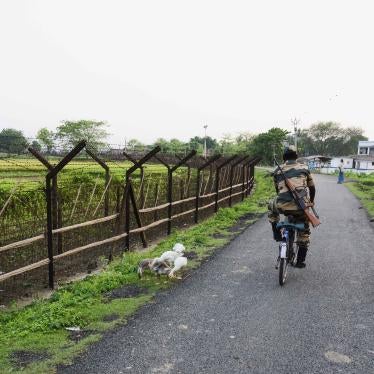Activists are continuing to protest in Dhaka to demand the repeal of the Digital Security Act (DSA), a sweeping and vague law that the Bangladesh authorities are using to arrest critics, including those who speak out over the government's handling of the Covid-19 pandemic.
Recent protests ignited when, on February 4, Ahmed Kishore, a cartoonist, and Mushtaq Ahmed, a writer, were charged under the act after being held in pre-trial detention for nine months. Shafiqul Islam Kajol, a journalist, was also charged on February 4 under the DSA for posting defamatory information about Awami League leaders. The charges against Kajol come after he was allegedly forcibly disappeared for 53 days and held in pre-trial detention for seven months.
Ahmed, Kishore, and nine others named in the complaint were charged for posting on Facebook "propaganda, false or offensive information, and information that could destroy communal harmony and create unrest."
What did they post that was so offensive? Cartoons and political commentary criticising the government's response to the pandemic.
According to research recently published by Human Rights Watch, Kishore and Ahmed's arrests are part of a wave of actions by authoritarian governments using the Covid-19 pandemic as a pretext to censor free speech and the media. Human Rights Watch reporting shows that soon after the first cases were reported in March, instead of responding to complaints over shortages of protective supplies, the Bangladesh authorities cracked down. The authorities arrested (or cases were filed against) artists, students, political opposition members, and activists for writing on Facebook or other social media platforms about lack of PPE for healthcare workers or alleging underreporting of Covid-19 cases, or questioning whether Covid-19 relief measures are being properly implemented. Public sector healthcare workers and all other government officials were given notice to not speak to media outlets regarding the pandemic response, with the Government Servant (Conduct) Rules from 1979 being cited to justify this.
Most of these arrests have been under the Digital Security Act, a law with broad and vague language that the authorities use in abusive ways. It was enacted to end abuses under the much-criticised Section 57 of the Information and Communication Technology Act (ICT), but has ended up even more draconian in criminalising peaceful speech and forcing the media to self-censor. Praising his country's response to the pandemic and denying rampant censorship, Gowher Rizvi, the prime minister's international affairs adviser, admitted however to DW's Conflict Zone that there are problems with the DSA: "Sadly, we have now learned that some of the wordings are very loose and vague, which leaves it open to its abuse."
Under the DSA, "propaganda" against "the Liberation War, the spirit of the Liberation War, the father of the nation, national anthem, or national flag" are punishable with up to life in prison. Publishing content that "hurts religious sentiments or religious values" or "destroys communal harmony, or creates unrest or disorder" is punishable with up to 10 years in prison. The terms are so broad that the authorities can essentially arrest anyone they want based on any online activity, from "liking" a Facebook post to drawing a cartoon.
The international community, including the UN high commissioner for human rights, UN independent experts, and the European Union, as well as journalists in Bangladesh, have repeatedly criticised the DSA for stifling free speech and violating international law. In May, 311 members of Bangladesh civil society issued a joint statement calling for the government to release those held under the DSA.
The Bangladesh government has ignored these calls, instead further building up its capacity to monitor and censor online commentary in order to issue more arrests under the DSA.
While the government has released thousands of people from detention to protect against the spread of Covid-19 in overcrowded prisons, it excluded critics and activists charged under the DSA. Kishore and Ahmed's bail pleas have been rejected six times. UN experts have called for Kishore's release on humanitarian grounds because he has insulin-dependent diabetes and his health is deteriorating, putting him at increased risk of complications from Covid-19. They have called for charges to be dropped "in light of Bangladesh's obligations under international human rights law."
As we reach the one-year mark of a global pandemic, it has become clear that for transparent, and timely access to information, the right to free speech is a priority. Bangladesh should stop arresting critics and urgently release Kishore, Ahmed, and other activists being held arbitrarily under the Digital Security Act.










